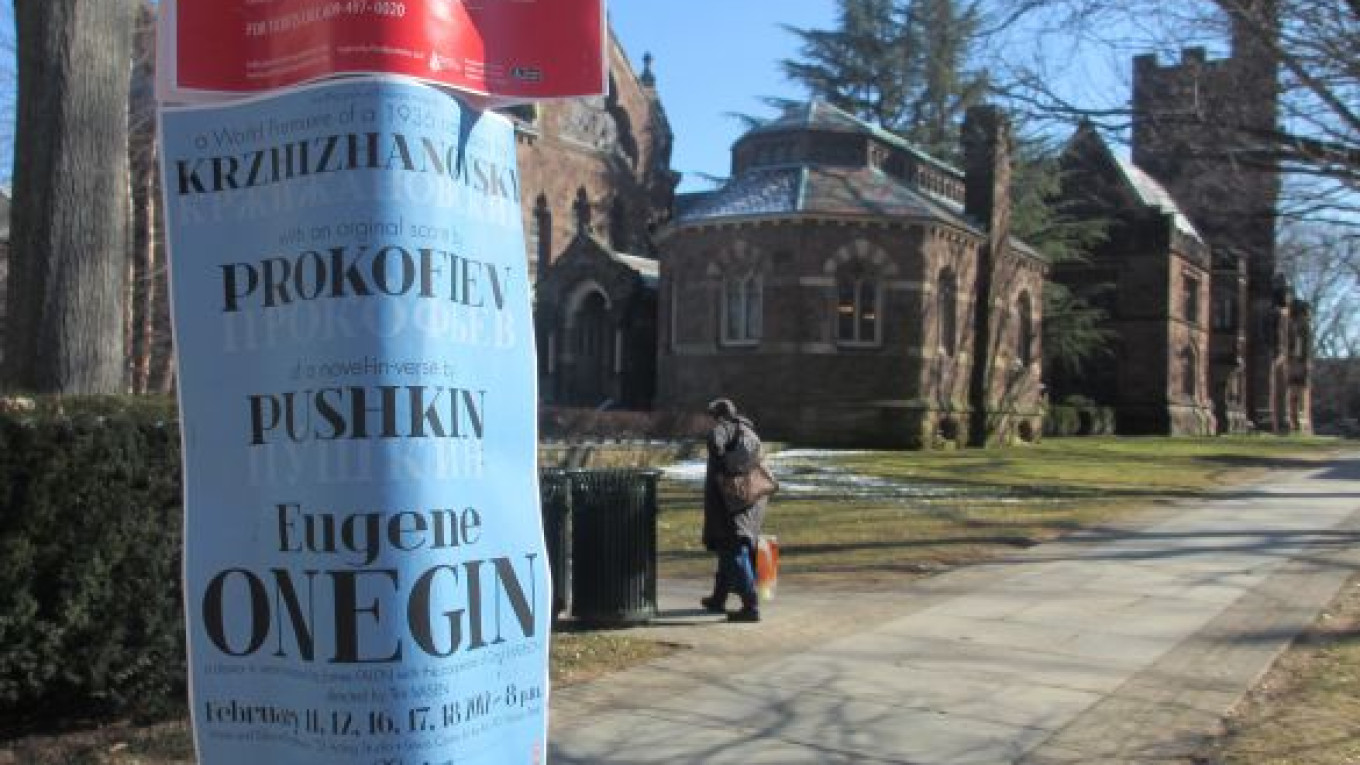A play lost but not quite. A musical score quartered and plundered. Three great names in the Russian arts — Alexander Pushkin, Sergei Prokofiev, Alexander Tairov — who were to have come together under a single marquee in 1937 but never quite did.
Until now, that is.
Caryl Emerson is a professor of Slavic and comparative literature at Princeton University. Together with Simon Morrison, a Prokofiev scholar at Princeton, she spent the last week suffering the pangs of anxiety that only those in theater know.
Would the show come together? Would the show fall apart?
The show, in this case, is "Eugene Onegin" in an adaptation that was originally to have been mounted at Tairov's Chamber Theater in Moscow for the Pushkin centennial in 1937. That never happened because the play was banned and abandoned. It has now taken form at Princeton, however, where an ambitious project highlights two aspects of the work in two different productions.
On Thursday a so-called "music-and-dance-forward version" was presented by the Princeton Symphony Orchestra, conducted by Rossen Milanov, with choreography by Sydney Schiff. Performed one time only at Princeton's stately Richardson Auditorium, this concert resurrected all of the music that Prokofiev wrote for "Onegin" 75 years ago.
On Friday the "words-forward version" began a two-week run at the Matthews Acting Studio on the university campus. It plays again in Princeton Fri., Sat. and Sun. at 8 p.m. Directed by Tim Vasen and acted by Princeton students, this dramatic performance features aspects of Prokofiev's score as performed in a chamber setting by pianist Anna Tchetchetkine.
Emerson, the project manager and inspiration behind the performances, admits to having a strong personal commitment to the project. The play, a radical adaptation of Pushkin's verse novel, was created by the writer Sigizmund Krzhizhanovsky, whose reputation Emerson has been instrumental in rehabilitating over the last decade.
Once entirely forgotten in Russia and utterly unknown outside it, Krzhizhanovsky has received considerable attention since his stories, novellas and dramas were unearthed beginning in the late 1980s. Emerson has championed the emergence of what critic Robert Chandler in the Financial Times called "one of the greatest Russian writers of the last century."
The Princeton "Onegin" is not a traditional reconstruction of an old theater piece, Emerson declares, for the simple reason that it was never even cast in 1937. The pieces were created — Prokofiev wrote the music and Krzhizhanovsky submitted his adaptation — but they never came together as a whole.
In the case of Prokofiev's music, this was, perhaps, not a major loss. As Emerson puts it, Prokofiev "never lost a good tune," and he recycled much of the music into other compositions. The themes following the character of Tatyana in "Onegin," for example, were later given a new home in the Natasha Rostova segments of the composer's opera "War and Peace."
But Krzhizhanovsky's adaptation was not the kind of work that could be reused, and it was consigned to the dust heap of history. Until now it has never been published or performed in any language.
Emerson wonders aloud what reactions might have been if "Onegin" had been performed at Tairov's Theater.
"Pushkin purists didn't like the adaptation," she declares, because of the many changes Krzhizhanovsky made. This included beginning with Chapter Two, rearranging other segments and, as Emerson describes it, "forcing" characters to speak their own words, rather than having a narrator report them.
The scholar suspects problems were inherent from the beginning.
Prokofiev's music was probably "too lush and public" for the kind of play Krzhizhanovsky created, Emerson opines and then, clearly without expecting an answer, she asks how one could put Prokofiev's "grand, glorious" music together with Krzhizhanovsky's "small, private, phantasmagorical" text.
Prokofiev admirers will surely be interested to hear how the composer entered into a creative dialogue with Pyotr Tchaikovsky, whose "Eugene Onegin" opera is revered as one of the greats. Prokofiev quotes Tchaikovsky almost note-for-note in parts of the scene where Tatyana writes a love letter to Onegin. But elsewhere, Emerson asserts, Prokofiev took the music places Tchaikovsky never could have gone.
Prokofiev's music to Tatyana's dream is done in a "scary way," Emerson noted. Tchaikovsky was "too much a romanticist to do that in its proper Gothic spirit."
Both the musical and dramatic performances of "Eugene Onegin" that I attended played to full houses. Whether or not that means new life has been breathed into a lost work remains to be seen. It is, after all, a long way from a university stage to a professional theater.
One thing is certain, though: a play not performed in 1937 has seen the light of day in 2012.
A Message from The Moscow Times:
Dear readers,
We are facing unprecedented challenges. Russia's Prosecutor General's Office has designated The Moscow Times as an "undesirable" organization, criminalizing our work and putting our staff at risk of prosecution. This follows our earlier unjust labeling as a "foreign agent."
These actions are direct attempts to silence independent journalism in Russia. The authorities claim our work "discredits the decisions of the Russian leadership." We see things differently: we strive to provide accurate, unbiased reporting on Russia.
We, the journalists of The Moscow Times, refuse to be silenced. But to continue our work, we need your help.
Your support, no matter how small, makes a world of difference. If you can, please support us monthly starting from just $2. It's quick to set up, and every contribution makes a significant impact.
By supporting The Moscow Times, you're defending open, independent journalism in the face of repression. Thank you for standing with us.
Remind me later.


